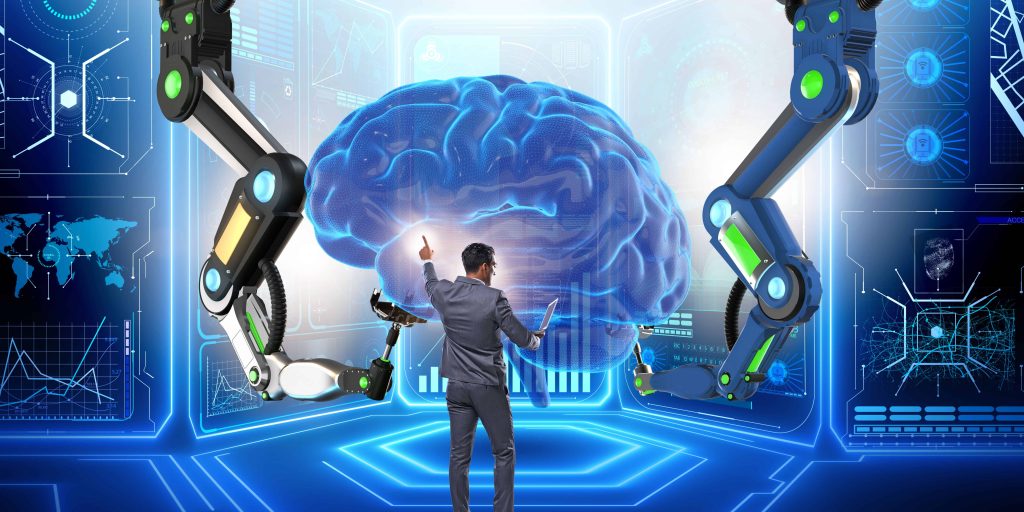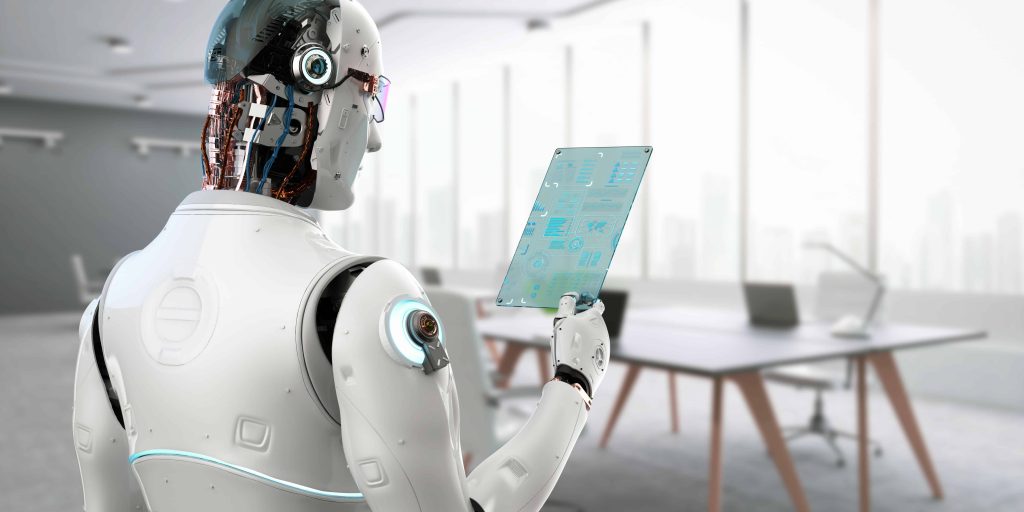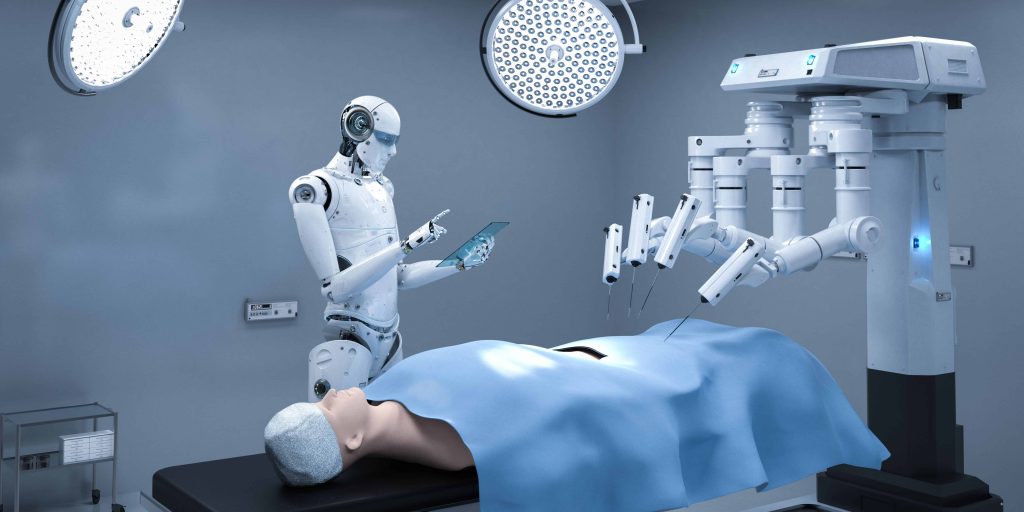Artificial intelligence (AI) has quickly become a transformative technology across all industries, and healthcare is no exception. In this article, we explore the profound impact of AI on healthcare, from diagnosing disease to improving patient care. We will delve deeper into the different applications of AI, its challenges, and the potential benefits it offers. Using machine learning algorithms and big data analytics, AI can help healthcare professionals make more accurate diagnoses, predict outbreaks, streamline administrative tasks, and even aid drug discovery. In addition, it has the potential to revolutionize personalized medicine, making treatments more effective and tailored to each patient, thereby improving the overall quality of health services. However, ethical concerns, data privacy issues, and the need for regulatory frameworks are some of the challenges to fully realizing the potential of AI in healthcare.
The promise of AI in healthcare

AI in diagnosis: a new era
AI has revolutionized medical diagnosis. Using machine learning algorithms, AI can analyze large amounts of medical data, including images, and make accurate diagnoses. In radiology, for example, AI can quickly detect abnormalities in X-rays, MRIs, and CT scans, improving the accuracy and efficiency of diagnoses. This technology streamlines healthcare processes, reduces human errors, improves patient outcomes, and allows healthcare professionals to focus on treatment plans and care, transforming the way we approach patient care. health in the modern era.
Predictive analytics and early intervention
Additionally, AI-based predictive analytics not only identifies potential health issues at an early stage but also allows healthcare professionals to tailor treatment plans to patients, thereby improving the quality of care and ultimately leading to potentially life-saving interventions and cost savings in the healthcare sector system.
Challenges and concerns

Privacy and data security
To address these issues, healthcare organizations implement strict data encryption measures, regularly update their security protocols, and conduct rigorous data protection training for their employees. They also adhere to strict compliance standards, such as HIPAA in the United States, to protect patient information. Additionally, AI algorithms are continually refined to improve their accuracy and efficiency while minimizing the risk of false positives and negatives. Additionally, ongoing research and development efforts aim to increase the interpretability of AI so that healthcare professionals can trust and understand information from these advanced systems. By actively prioritizing data privacy and security, the healthcare industry can harness the full potential of AI while maintaining patient trust and well-being.
Ethical considerations
AI in healthcare also raises ethical questions. For example, how should AI systems prioritize the allocation of resources, such as organ transplants, when demand exceeds supply? These decisions made by AI systems can have life-or-death consequences, requiring the development of essential ethical guidelines. Determining who receives critical medical interventions based on algorithms rather than human judgment presents complex challenges and requires ongoing discussions to ensure fair and equitable allocation of resources while maintaining public trust in healthcare decision-making. AI-based healthcare.
Improve patient care

Improved patient experience
AI has the potential to personalize patient care like never before. Virtual health assistants can provide patients with information, reminders, and emotional support, improving their overall experience. They enable healthcare providers to monitor patient data in real time, enabling early intervention and personalized treatment plans. These AI-powered tools enable patients to actively manage their health, making healthcare more patient-centered. Additionally, Artificial intelligence can analyze massive data sets to predict disease trends, improve diagnostics, and optimize treatment protocols, thereby revolutionizing healthcare. The company’s active role in streamlining healthcare processes results in greater efficiency and better allocation of resources, ultimately leading to better patient outcomes and a more responsive and efficient healthcare system.
Reduce medical errors
Medical errors are a major problem in healthcare, but AI-based decision support systems enable healthcare professionals to make more accurate diagnoses and treatment plans, reducing actively the risk of errors, thereby improving patient safety and the overall quality of healthcare.
AI in drug discovery

Accelerate drug development
The drug discovery process, known for its long lead times and exorbitant costs, will benefit immensely from the integration of artificial intelligence (AI). AI systems have the ability to quickly locate potential drug candidates, predict their effectiveness, and even formulate new molecules, thereby streamlining the process, saving valuable time and resources, and ultimately driving drug creation more powerfully and efficiently.
Challenges and concerns

Regulatory conformity
The integration of artificial intelligence (AI) in healthcare has undoubtedly revolutionized medical practices, diagnostics, and patient care. However, this also brings with it a series of regulatory challenges that need to be carefully considered. To ensure the safe and ethical use of AI in healthcare, governments and health authorities need to establish comprehensive frameworks. These frameworks should include not only the development and deployment of AI-based medical devices but also the approval processes for these technologies. The regulatory landscape must address issues related to data privacy, security, liability, and patient consent, as well as the potential biases inherent in AI algorithms.
Education and formation
Another crucial aspect of successfully implementing AI in healthcare is education and training. Healthcare professionals, from doctors and nurses to medical technicians, must be sufficiently educated and trained to effectively use AI tools in their daily practice. This requires a significant commitment of resources and time, as the field of AI is constantly evolving, and keeping up to date with the latest developments is an ongoing process. Continuing education and professional development are essential to ensure that healthcare professionals are not only experts in the use of AI but also informed about the ethical and legal considerations associated with its integration into healthcare systems.
The Future of AI in Healthcare

AI and robotics in surgery
Robot-assisted surgery, guided by AI, offers greater precision and less invasiveness, allowing surgeons to actively perform complex operations using robotic instruments. This collaboration between human expertise and AI-based technology results in shorter recovery times for patients and better surgical outcomes.
AI and precision medicine
Precision medicine actively tailors’ medical treatment to each patient’s characteristics by using artificial intelligence (AI) to analyze a patient’s genetic makeup, lifestyle, and environmental factors. AI actively processes a patient’s genetic data and identifies genetic variations and mutations that may impact their health. It also actively evaluates lifestyle choices and habits, using data analysis to correlate with health outcomes and provide personalized recommendations. Additionally, AI actively monitors environmental factors, taking into account variables such as air quality and exposure to toxins, to identify potential health risks. The culmination of these active assessments results in the creation of highly individualized treatment plans ranging from personalized medicine to lifestyle changes and environmental modifications, fundamentally changing health care from a one-size-fits-all approach to comprehensive care. precise and patient-centered.
Final Verdict
The impact of AI on healthcare is undeniable and its potential benefits are far-reaching. From improved diagnostics and patient care to accelerated drug discovery and enhanced telemedicine, AI is transforming the industry. However, it also poses challenges around data privacy, ethics, regulation, and education. The future of AI in healthcare is bright, but successful integration requires careful consideration of these challenges and a commitment to responsible and ethical use. In a rapidly evolving field, continued research, development, and collaboration between healthcare professionals, technology experts, and policymakers are essential to harnessing the full potential of AI and improving healthcare and patient well-being.





